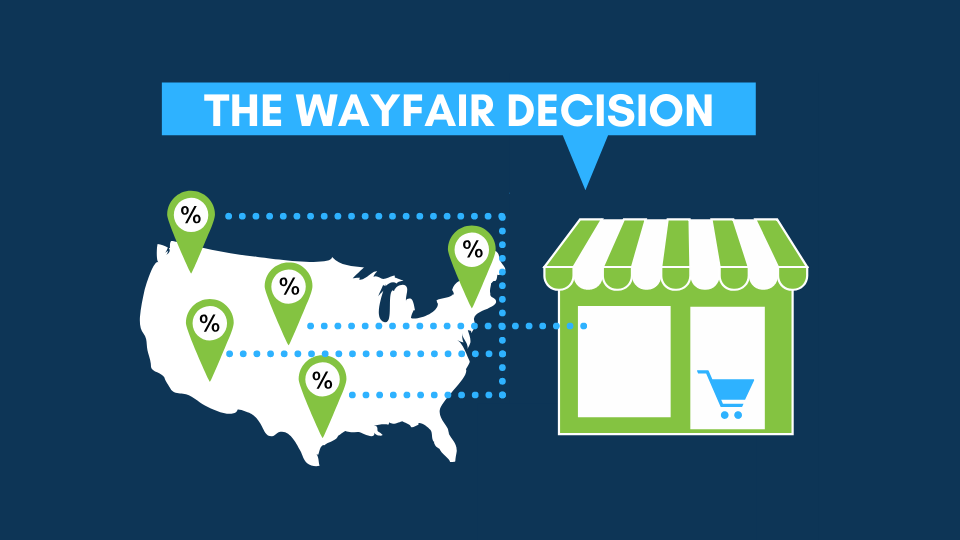The Wayfair Decision and How it May Impact Your Business
The Supreme Court’s Wayfair decision reshaped the sales tax landscape, allowing states to require tax collection based on economic activity—not just physical presence. If your business sells across state lines, now is the time to review where you may have nexus and ensure you’re compliant with evolving state tax laws.
On June 21, 2018, the Supreme Court of the United States handed down a historic decision in the sales and use tax nexus case South Dakota v. Wayfair, Inc. The 5-4 ruling overturns physical presence standards upheld in previous cases, such as Quill Corp. v. North Dakota (1992) and National Bellas Hess Inc. v. Department of Revenue of Illinois (1967), where a business had to have a physical presence in the state for the state to impose sales and use tax collection obligations on the business.
Nexus
Nexus describes the amount and degree of a taxpayer’s connection with a state before the taxpayer becomes subject to the state’s taxing jurisdiction. If a taxpayer has established sales and use tax nexus, the state will require the taxpayer to register, collect and remit sales and use taxes on sales made to purchasers in that state.
States exercise their power to tax through statutes, case law, regulation or policy. Generally, state statutes are broadly written and include phrases such as “doing business in” or “deriving income from” to describe activity that will trigger nexus and thus a filing obligation. Statutes tend to vary from state to state.
In recent years, many states have become more aggressive in enacting various statutes that require out-of-state sellers to collect and remit sales tax. Over half of the states that impose a general state-wide sales taxes now have addressed a form of “economic” nexus, where nexus is generally established based on a certain threshold of economic activity in a state rather than just a physical presence.
Significance of the Wayfair Case
In 2016, South Dakota passed an economic presence statute that required out-of-state sellers to collect and remit sales tax as if the seller had a specified level of activity in the state. This new standard applied if the business delivered more than $100,000 of goods or services in South Dakota or engaged in 200 or more separate transactions in South Dakota in the current calendar year or the prior calendar year. The case was ultimately heard by the U.S. Supreme Court, which concluded that the physical presence rule of Quill is “unsound and incorrect.” By overturning Quill, the Court opened the possibility for states to impose sales tax collection obligations (and perhaps other taxes) based on economic presence.
Taxpayer Considerations
The U.S. Supreme Court’s decision in Wayfair will affect companies that have economic presence in a state that meets that state’s nexus standard within the Court’s new ruling. It especially impacts online businesses where, in the past, the lack of a physical presence prohibited a state from imposing sales and use tax collection requirements on those businesses. Most immediately, out-of-state sellers that deliver goods or provide services into a so-called “economic presence” state will need to determine if the business exceeds the state’s specific economic sales or activity thresholds, generally in the prior calendar year or previous 12 months. Currently, at least 25 states have enacted economic nexus models with varying enforcement dates. Other states are issuing nexus guidance suggesting economic nexus policies may be enacted. Sellers may need to conduct an analysis on each state that has adopted, or plans to adopt, economic nexus threshold requirements for sales and use tax collection to ensure they are in compliance with all jurisdictions (state and local) in which they have customers. It is also reasonable to expect that states may use this ruling to determine economic nexus thresholds for state income tax purposes as well.
Now is the Time to Review Your Sales and Use Tax Compliance Requirements
The landscape of sales and use tax, and state income tax compliance has been significantly altered with the recent Wayfair decision, especially for online sellers. It’s important to understand where your business has nexus and how the recent ruling may impact your taxes and reporting requirements.
If you would like to discuss state tax issues for your business, please let us know. This is a narrow specialty in tax that is evolving rapidly. Rules are changing constantly and vary dramatically on a state to state basis. All of these factors contribute to complexity and cost for business owners. While we are not specialists in state taxes, we can brainstorm your issues and connect you with a specialist as needed.
No Professional Advice, Client Relationship, or Reliance on Information
Please note that any information or content on our Website, or any forms or tools on our Website which allow you to submit information or make calculations, and your use thereof, are not intended to provide any kind of professional advice, consultation or service, including but not limited to, legal, accounting, tax, or business advice. Nor does any such information, content, forms, or tools, or your use thereof or reliance thereon, create or constitute an attorney/client, accountant/client, or consultant/client relationship. You should therefore not use our Website or reliance on any information, content, forms, or tools on our Website as a substitute for any kind of professional advice. Rather, you should consult with a licensed professional, including one employed by our Company, for any accounting or tax questions you may have. You agree that we will not be liable to you or to any third party to the extent you treat or consider any information, content, forms, or tools on our Website as constituting any kind of professional advice. The information and content, including but not limited to forms and tools, presented on or made available through our Website are made available solely for general information purposes. We, therefore, do not warrant the accuracy, completeness or usefulness of any such information, content, forms, or tools, and any reliance you place on the same is strictly at your own risk. We disclaim all liability and responsibility arising from any reliance placed on such materials by you or any other visitor to our Website, or by anyone who may be informed of any of its content.
Our Website provides illustrative lists of services that we provide. Nothing contained on our Website shall be construed as an offer or guarantee to provide any particular services to you, nor shall anything on our Website be construed as a direct solicitation for employment by any persons, companies, or organizations. Prior results we have obtained for others do not guarantee a similar outcome.


 Ron Skalberg
Ron Skalberg




